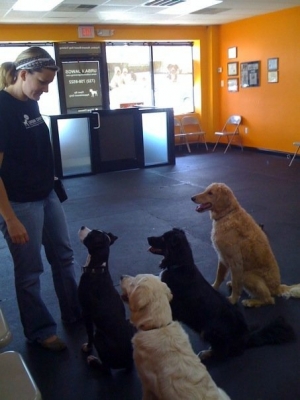Erica Houck Young

Erica Houck Young is a professional dog trainer and behavior consultant in Monmouth County, New Jersey. She works with clients both privately and in group settings for behavioral and obedience purposes. She has also assisted classes at a local training outfit for the past year. She has been training for both competition and companion animal purposes for over 10 years. She was born and raised in small-town Minnesota, surrounded by both large and small animals. She was successful in training and showing large animals and dogs during her high school and college careers in several facets. She spent nearly 3 years working as a part, and then full, time veterinary technician for a veterinary clinic with 6 doctors on staff.
In late 2007 she became part of the Monmouth County SPCA's adoption manager staff and quickly settled into a role that balanced between both the adoption and behavior departments. She focused on training, rehabilitating, and rehoming dogs whose fear and mistrust of humans made them virtually unadoptable. She dedicated herself to those particular hard dogs to adopt, fostering and training those animals most of the public would overlook in order to make them more attractive. She also helped facilitate in the start of an enrichment program alongside Urban Dawgs that was specifically aimed at Pit Bull Dogs. The program was designed to provide an outreach for shelter dogs who needed extra behavioral training and guidance that could not be achieved in the shelter environment.
In 2008 Erica graduated with honors with her certification in training and behavior counseling from the prestigious San Francisco SPCA Academy for Dog Trainers, She worked and studied under the direct tutelage of some of the best in the business, including Jean Donaldson and Janis Bradley, while there. The San Francisco SPCA's Academy for Dog Trainers has been hailed as the "Harvard" of dog training schools for its rigorously scientific and humane approach to behavior and training.
Erica remains active in rescue, volunteering her spare time to fostering and training for various all-breed and breed specific(Pit Bull) rescue organizations located along the East Coast. She provides behavior and training support to both fosters and adopters. She is also committed to continuing her education about dog behavior and training, as well as shelter enrichment. She regularly attends seminars and workshops given by dog behavior experts such as Dr Ian Dunbar, Dr Karen Overall, and Jean Donaldson. She strives to be at the forefront of the newest studies and techniques in positive, reward-based training for dogs. She is also a member of the Association of Pet Dog Trainers.
Erica lives in Middletown, NJ with her husband, Chris, 4 rescued cats, and their 4 rescued dogs: an Australian Cattle Dog, an American Pit Bull Terrier, a Yellow Lab, and one Wonder-Mutt.











